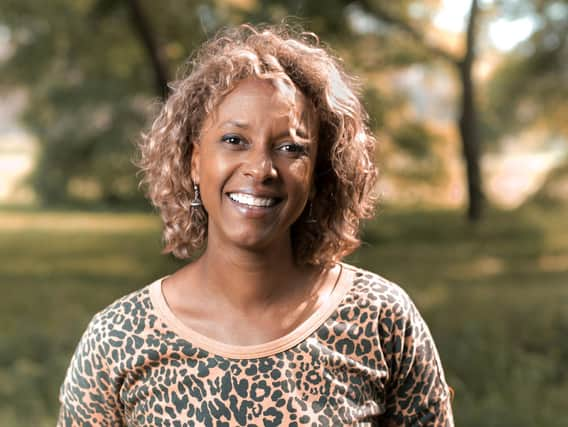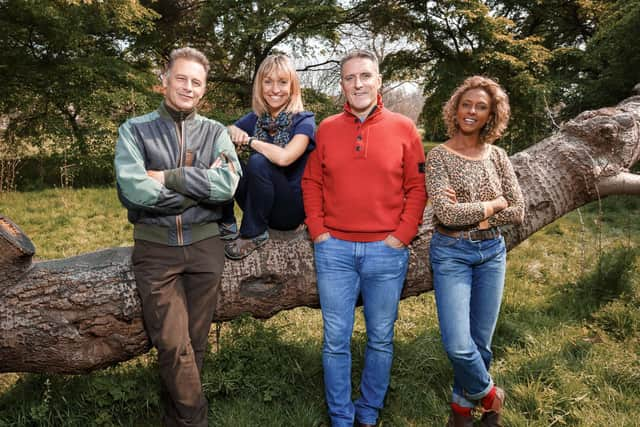Gillian Burke to tune into wildlife in Yorkshire with new series of Autumnwatch


As temperatures dip and British wildlife begins to nestle down for the winter, the hard work is only just beginning for the BBC’s Autumnwatch team.
Returning for two weeks as part of the show’s annual installment, the BBC Two staple is once again set to highlight the wonders of the natural world – albeit with a number of Covid-related tweaks.
Advertisement
Hide AdAdvertisement
Hide Ad“It’s not just a job for us, we absolutely live and breathe it,” says Autumnwatch presenter Michaela Strachan.


It’s a statement made all the more poignant by the fact Strachan, 54, found herself locked down in South Africa where she lives with her family for the show’s previous edition, Springwatch.
“To not be able to be part of the team because I couldn’t get there was extremely frustrating,” she reflects.
“But I have to say, I felt part of the team because I watched it every day and I was so proud of what they managed to achieve at such a difficult time.
“I have a particularly fantastic location this year.
Advertisement
Hide AdAdvertisement
Hide Ad“I can forget about the anxiety and the stress; I’m here now and I’m absolutely chuffed to be part of the watches and part of the team.”
The show – which has been enjoyed by millions since its launch in 2005 – will feature footage collected from remote cameras, alongside pre-recorded features and new live segments from presenters located across the country.
Autumnwatch 2020 will see Strachan broadcasting from Tentsmuir Forest in Fife, Scotland, a location renowned for its picturesque landscape and thriving seal population.
“I’m going to miss Chris (Packham, her co-presenter), I’m not going to lie, it’s going to be very different,” says Strachan of the new Covid friendly setup, which sees all four presenters bid farewell to the central studio.
Advertisement
Hide AdAdvertisement
Hide Ad“But because I am doing cute baby seals, oh boy am I going to go on and on about how cute they are!” she laughs.
Joined by co-presenters Packham, who is set to report from his home in the New Forest, Iolo Williams from the Centre for Alternative Technology in Wales, and Gillian Burke at RSPB Old Moor in South Yorkshire, the show is set to showcase the true beauty of Britain’s native wildlife.
“Can I be honest with you?” enquires Packham, 59.
“Thinking back to Springwatch, we faced an enormous challenge technically to get the programme on the air under those circumstances.
“We all faced a challenge in terms of having to adapt to a new way of working.
“Communicating with one another was far more difficult.
Advertisement
Hide AdAdvertisement
Hide Ad“We couldn’t just go and meet in the portacabin as we normally would.
“And I think that sometimes, those sorts of tests, those sorts of trials, bring out the best in people because they make everyone sit up and try harder.”
With live cameras located on a wild Scottish island in the Firth of Forth set to capture dramatic footage of grey seals pupping, this time around the show hopes to act as a beacon of light in amongst the continuing uncertainty of Covid.
“With all the negativity that’s going round, the last thing we want to do in our programme is just throw all the negativity at you and add to the Covid problems, the recession problems, the Brexit problems, America problems – because obviously the election is happening during Autumnwatch,” Strachan remarks.
Advertisement
Hide AdAdvertisement
Hide Ad“We have to make people really fall in love with wildlife, weave the conservation stories in with it and make people care and really want to make a difference.
“It’s something that we’re very aware of.”
With the UK’s spring lockdown still fresh in our minds, the team hopes that the restrictions will have long lasting, positive consequences.
Whether it’s a newly found appreciation for our metropolitan green spaces or an increased awareness of the local animal population, Covid has helped open the nation’s eyes to the natural world around us.
“It wasn’t that the wildlife wasn’t there.
“I just think that people have been seeing it without looking at it and they’ve been hearing it without listening to it – and there’s a subtle difference,” remarks Packham.
Advertisement
Hide AdAdvertisement
Hide Ad“With that extra five minutes that they had on their walk because they weren’t rushing to work or rushing to school, it gave them the time to stop and then to engage a little bit more.
“And we hope that people don’t go back again to forgetting about it because it was an enormous benefit to them.”
It’s a theory seconded by fellow Autumnwatch presenter Burke, 42, who found herself locked down on the south coast during the spring instalment.
“Modern life is stressful,” she points out.
“We process a lot of information, whether it’s via our social media feed, via mainstream news outlets, it’s our work, it’s our jobs, it’s our kids, it’s our relationships.
Advertisement
Hide AdAdvertisement
Hide Ad“So nature – being able to access the outdoors, being able to watch a plant grow on your window box, watching the leaves turn colour in the autumn – is one way of getting some respite from those stresses in your life.
“Being based in Cornwall, it was very interesting.
“Through Spring, apart from locals, the beaches were very, very quiet.
“We noticed more birds foraging on beaches where there would normally be people.
“You could immediately see there are opportunities that wildlife are missing out on because normally there would be people there.
Advertisement
Hide AdAdvertisement
Hide Ad“And with their absence we could see this is foraging ground, it’s not just a beach.
“And then the summer was incredibly busy…I think at one point we had six times the normal amount of visitors to Cornwall than we’d normally have the same time in previous years.
“But what was palpable, what you could really feel, was how much people needed that space, needed to get outside.”
As the days shorten and the nation swaps sun drenched parks for centrally heated homes, Burke points out that exposure to nature, whether that is a crisp walk outdoors or simply tuning into the show, might just provide the dose of positivity we’ve all been looking for.
Advertisement
Hide AdAdvertisement
Hide Ad“I think it would be naive not to acknowledge that this is going to be a tricky autumn and winter for all of us,” she reflects.
“Hopefully, being able to bring nature to our audience is going to give them that little respite from what has otherwise been a really challenging year.”
Autumnwatch returns to BBC 2 today.
Support The Yorkshire Post and become a subscriber today. Your subscription will help us to continue to bring quality news to the people of Yorkshire. In return, you'll see fewer ads on site, get free access to our app and receive exclusive members-only offers. Click here to subscribe.